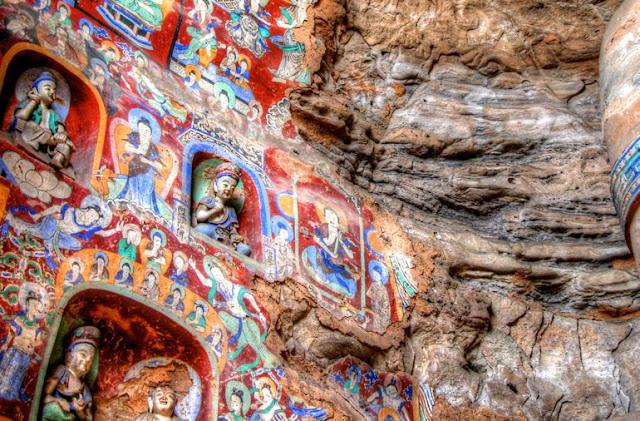The Buddha's philosophy teaches us that our desires are at the root of our restlessness -
and that calm can be achieved through willpower and spiritual exercise.
The Philosophy of The Buddha
Where was the Buddha born?
Why did his father keep him isolated?
What four men did Gautama meet?
What does the term "nirvana" refer to?
What does the name "Buddha" refer to?
What unifies all living things, according to Buddhism?
What does the "middle way" allow us to do?
What are the four noble truths?
1.
2.
3.
4.
What is the Noble Eightfold Path? Write the eight aspects of rightfulness on the sides of the octagon:
What about the Eightfold Path often strikes a western observer?
What are sutras?
Where did Buddhism develop during the Buddha's lifetime?
Who is responsible for the spreading of Buddhism across Asia?
Where is Theravada Buddhism followed?
Where is Mahayana Buddhism followed?
What does Buddhism try to teach us about suffering?
Language
Foothills (n)
To be prophesied (pass. vb)
Excursions (n)
Inevitable (adj)
In the midst of (adj phr)
Solace (n)
Enlightenment (n)
Distraught (adj)
To bathe (v)
To abstain from (v)
To cultivate (v)
To transcend (v)
To prompt (v)
Noble (adj)
Outlook (n)
Vain (adj)
To invert (v)
Impulses (n)
A limb (n)
To spur (v)
A selection of Buddhist art, temples, shrines and architecture from around Asia. Can you guess which countries?
Kahoot
Da Buddha
Buddha
the former
then called
is a story
between
desperately wanted
imaginable
The story of the Buddha’s life, like all of Buddhism, 1___________
about confronting suffering. He was born 2_________ the sixth and fourth century B.C.,
the son of a wealthy king in the Himalayan foothills of Nepal. It was
prophesied that the young Buddha — 3__________ Siddhartha Gautama — would
either become the emperor of India or a very holy man. Since Siddhartha’s
father 4_________ him to be 5__________,
he kept the child isolated in a palace with every 6____________ luxury: jewels, servants, lotus
ponds, even beautiful dancing women.
Cloze
7___ 29 years, Gautama lived in bliss, protected from even the
smallest misfortunes of the outside word: “a white sunshade was held over me
day and night to protect me 8____ cold, heat, dust, dirt, and dew.” Then at the
age of 30, he left the palace for short excursions. 9____ he saw amazed him:
first he met a sick man, then an aging man, and then a dying man. He was
astounded 10___ discover that these unfortunate people represented normal—indeed,
inevitable—parts of the human condition that 11____ one day touch him, too.
Horrified and fascinated, Gautama made a fourth trip outside the palace
walls—and encountered a holy man, who 12___ learned to seek spiritual life 13___
the midst of the vastness of human suffering. Determined to find the same
enlightenment, Gautama left his sleeping wife and son and walked away from the
palace 14___ good.
Verb form:
Gautama tried 15 learning / to
learn from other holy men. He almost starved himself to death by 16 avoiding / avoid all physical comforts and
pleasures, as they 17 did / had done.
Perhaps unsurprisingly, it did not bring him solace from suffering. Then he
thought of a moment when he was a small boy: 18 to sit / sitting by the river he’d noticed that when the grass 19 was cut / cut, the insects and their
eggs trampled / were trampled and
destroyed. 20 To see / Seeing this, he’d
felt compassion for the tiny insects.
Reflecting on his childhood compassion, Gautama 21 was feeling / felt a profound sense of
peace. He ate, meditated under a fig tree, and finally 22 reached / had reached the highest state of enlightenment:
“nirvana,” which simply means “awakening”. He became the Buddha, “the awakened
one”.













































No comments:
Post a Comment